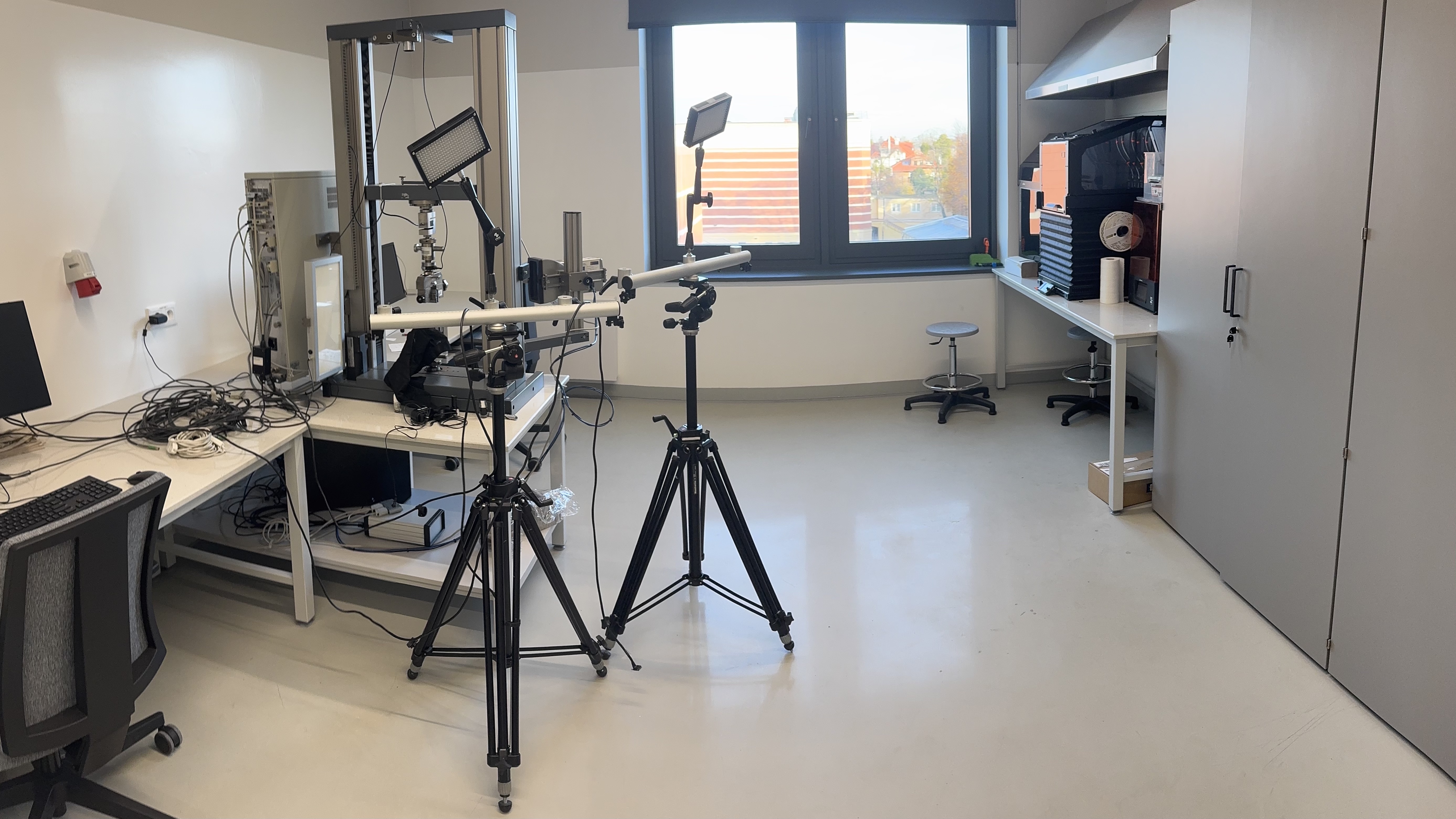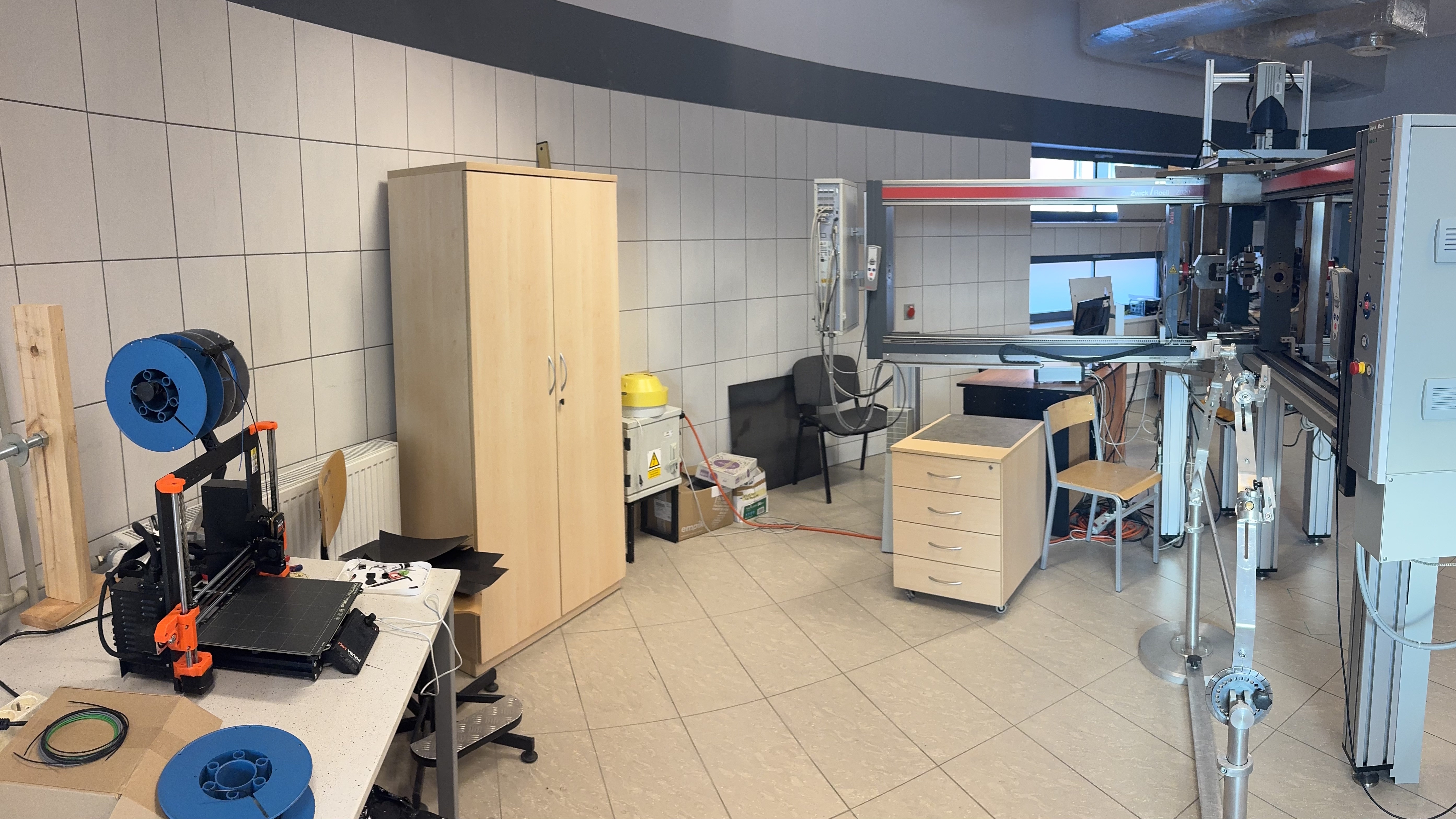The Laboratory of Structural and Material Mechanics operates within the Faculty of Civil and Environmental Engineering at Gdańsk University of Technology. The laboratory consists of two separate facilities located on the Gdańsk Tech campus: the Laboratory of Prototyping and Precision Measurements (Building CEI, Room 312) and the Laboratory of Structural and Material Engineering (located in the Kuźnia building and the Huber Hall in Żelbet).
The Laboratory of Prototyping and Precision Measurements is dedicated to research in the field of structural prototyping, testing of engineering materials, and precision geometrical and mechanical measurements. Its equipment includes, among others, 3D printers, digital image correlation (DIC) systems, 3D scanners, and small-scale mechanical testing machines.

The Laboratory of Structural and Material Engineering is intended for experimental and strength testing of structural and engineering materials at large scale. It enables testing of steel, aluminium, concrete, and adhesively bonded elements under various loading conditions. The facility serves as the main research and teaching base of the Department of Structural Mechanics in the areas of structural mechanics and material engineering.

We collaborate with research units at Gdańsk University of Technology and with other universities in Poland and abroad. Our mission is to support the development of science and industrial innovation - from civil engineering to biomechanics. By combining knowledge and experience with state-of-the-art equipment, we deliver reliable results and practical solutions - ranging from support for education to research, testing, and design services for industry.
The laboratory is equipped with universal testing machines and specialized research stations, which make it possible to conduct both standard material tests and non-standard experiments tailored to the needs of specific scientific and industrial projects. Below is a selection of devices that constitute the core equipment of the laboratory.
Universal Testing Machine Zwick-Roell Z020
The Zwick Z020 is a compact, benchtop machine with a load capacity of up to 20 kN. It enables standard tensile, compression, and bending tests on small-sized specimens. The machine is compatible with an optical extensometer and a system of accessories that allow the test setup to be adapted to different types of experiments.
Universal Testing Machine Zwick-Roell Z400
The Zwick Z400 is a high-capacity testing machine with a maximum force of 400 kN, designed for advanced studies of materials and structural components. With its temperature chamber, tests can be performed in the range from -60 °C to +250 °C, enabling analysis of the influence of temperature on the properties of materials and joints. The machine ensures high measurement precision (positioning accuracy ±1 µm, force accuracy class 0.5).
Zwick-Roell BIAX020 Biaxial Testing Machine
The Zwick-Roell BIAX020 machine is designed for conducting biaxial tensile tests. The testing setup consists of four standard Z020 machines arranged horizontally and connected in a configuration that enables simultaneous loading of a specimen in two perpendicular directions. Each actuator has a load capacity of 20 kN, with a maximum grip spacing of approximately 2 m (minimum 0.6 m). The available grips allow mounting of flat specimens up to 20 cm in width. The machine is additionally equipped with a video extensometer that enables precise measurement of deformations in both directions. The system is primarily intended for testing the biaxial stress state of technical fabrics, foils, and thin membranes, allowing for the determination of their mechanical properties under realistic loading conditions representative of engineering structures.
3D Scanner EinScan HX
The EinScan HX is a handheld 3D scanner that uses hybrid light-source technology – structured LED light and blue laser. It enables fast scanning of objects with full texture (LED mode) as well as precise mapping of challenging surfaces such as dark, shiny, or metallic ones (laser mode). Scanning accuracy reaches up to 0.05 mm in LED mode and up to 0.04 mm in laser mode. The scanner captures point clouds and 3D models for further processing in CAD systems, comparative analyses, and documentation. It is applied in reverse engineering, quality control, research on structural elements, as well as the documentation of heritage objects. Thanks to its low weight (710 g) and ergonomic design, it can be used both in the laboratory and in fieldwork.
Climatic Chamber ESPEC LHU-114
The ESPEC LHU-114 climatic chamber enables testing under precisely controlled temperature and humidity conditions. The device allows experiments to be conducted within a range of –20 °C to +85 °C and 40–95 % relative humidity, with high parameter stability (±1 °C, ±5 % RH). The chamber has an internal volume of 105 L (test space dimensions: 500 × 600 × 390 mm), which makes it suitable for testing standard specimens as well as small structural components in long-term temperature–humidity cycles. It can be used, among others, for aging tests and for studying the influence of environmental conditions on the properties of structural materials.
Digital Image Correlation System
The Digital Image Correlation (DIC) system by DANTEC enables non-contact measurement and analysis of full-field displacements and strains of tested objects. The setup is equipped with VCXU-23M cameras (2.3 Mpx sensor, resolution 1920 × 1200 px) and two sets of lenses, including wide-angle ones. The system configuration allows operation with various camera arrangements (from 1 to 4), enabling adaptation of the measurement field to the geometry of the tested specimen or structural element. The purchase of the system was fully funded by the National Science Centre (NCN, Poland) under project no. UMO-2017/27/B/ST8/02518.
We are currently undertaking the expansion of the laboratory with the aim of creating a modern research environment offering extended measurement capabilities, encompassing static and dynamic testing as well as environmental studies (temperature and humidity).
The scope of modernization includes, among other things, the reconstruction of laboratory rooms, the organization of a technical workshop, and the purchase of advanced testing equipment, including strength testing machines designed for dynamic and creep experiments.



